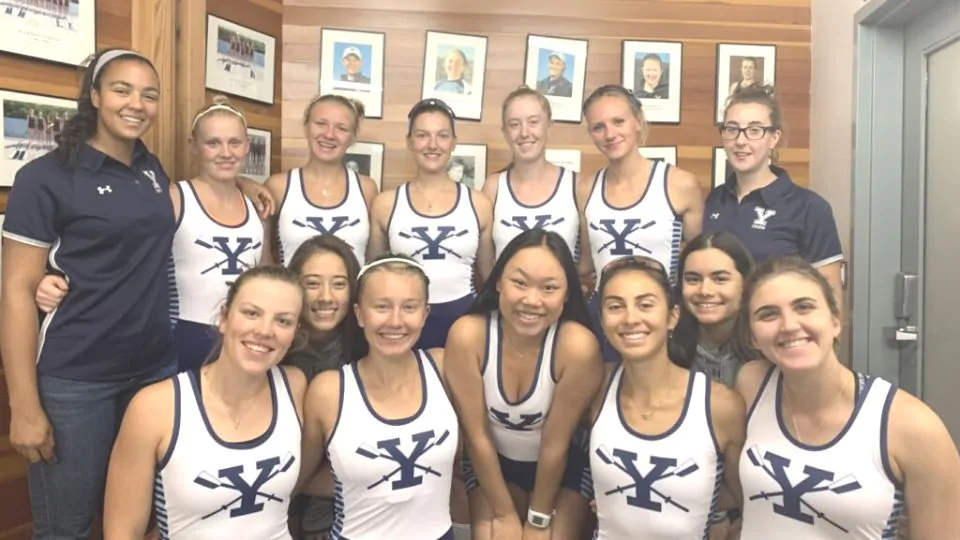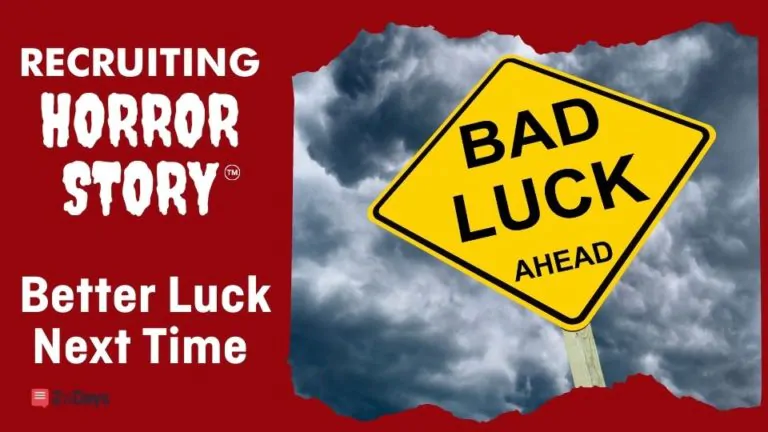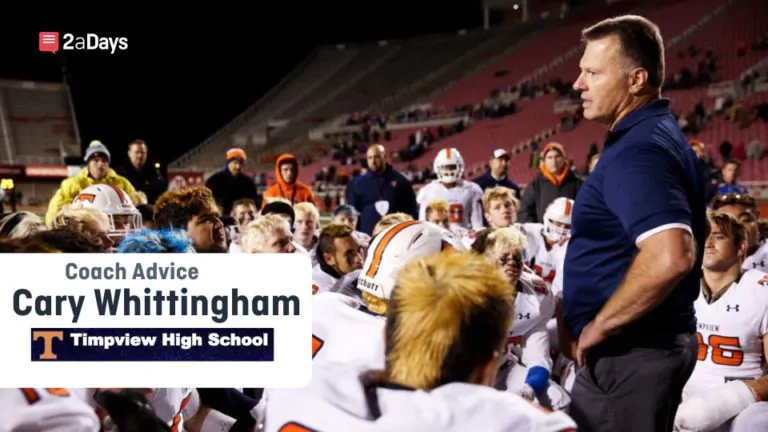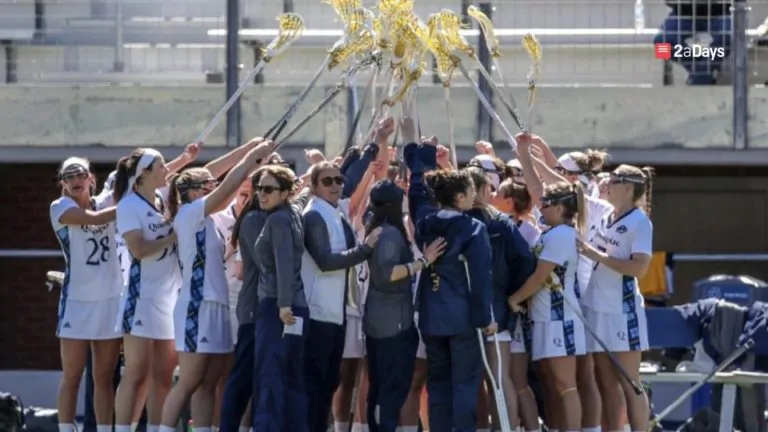As a fast rower in your senior year of high school, you're told the world is your oyster… but what if you're allergic to shellfish? You want to go further. How about an Ivy League?
Okay. The acceptance rate for Ivy League Universities in the United States is 6.78%, but that won't slow you down – your athletic training has separated you from many of your classmates, so why not push for some of the best continuing education available?
The eight Ivy League schools are Harvard, Princeton, Yale, Pennsylvania, Columbia, Cornell, Brown, and Dartmouth. They all offer a Division I rowing experience and partake in the Ivy League Rowing Championships every year, where Ivy League rowers race against each other in eights and fours.
Fun Fact: There are nine people in the “eight” (the largest type of rowing boat), but one of them is a coxswain, who does not row, but encourages the rowers and maps their race strategy. They are the lightest person in the boat (think “Jockey.”)
Ivy League entrance is internationally competitive, and the sport is not the only aspect of recruitment. School grades are also critical. In high school, if your school offers AP courses, take them. Try to challenge yourself with the highest level of academic courses you can manage, while still balancing your sport. If you want to row, but also study at an Ivy institution, you need to be driven and passionate about your studies and your sport!
2aDays spoke with a Yale Women's Crew athlete. “As an international student, I picked 3 ‘A' levels (English, History, Math) and a 1.5-year dissertation to simulate University level study,” she said. “Because there are so many variables to the University experience, you want to have some confidence knowing you're ready to adjust to the academics.”
Regardless of your athletic ability, you must take a standardized test to apply to an Ivy-league university. For the ACT, Ivy leagues typically encourage 31 and above, and for the SAT, push for 1300 and above.
Are you worried about your grades? Know that acceptance into an Ivy League is also a bit of a balancing act: the faster you are, the more wiggle room schools may allow with your grades. For instance, some athletes may score a 1050 SAT and pursue their athletic and academic careers at certain Ivies because they pulled a super fast 2k erg time senior year of high school.
My SAT score was on the lower side for Yale Crew girls, but luckily I made up for it with my Grade Point Average. My junior and senior year of high school average was 93, and I participated in extra-curricular activities, which I'm told helped with my Ivy application. The lesson of the day? Don't be afraid to mention all the things you've done!
Ivy League schools want to recruit student-athletes, not just exceptional athletes that will struggle in school. It is important to be a good person, a good student, and a good athlete.
When preparing to attend an Ivy League, high school rowers should start training similarly to the higher mileage they may experience in college. A Harvard Women's Crew athlete said, “It is very important that athletes get comfortable training twice a day, and get used to the more demanding rowing schedule. It is also important to incorporate lifts because a couple of girls on my team had never lifted before Harvard, and having the experience of already lifting made the training transition easier for me.”
It is also important to be in the right headspace to commit to both the academic and rowing side that college life brings. It is prevalent for crew athletes to take a gap year between finishing high school and starting University to further their rowing skills or improve their SAT scores.
Training in an Ivy League is intense. In-season, Ivies are allowed to train for 20 hours of coach organized practice per week. During the off-season, Ivies are allowed to train for six hours of coach organized practice a week. Most high-school athletes train about 12-22 hours a week, depending on the season, and depending on their level of competition.
If you want to prepare for Ivy-level training, I would recommend rowing a minimum of 15 hours a week. In high school, I was doing 18- 22 hours a week of cross-training, rowing and strength.
I would suggest working on your weaknesses and getting comfortable reacting to criticism and being able to correct yourself. The style of rowing that we do at university is different from what I learned from my Canadian coaches. Adapting and adjusting are key. Rowing well is a combination of many many small things – just like your admission process to an Ivy. Coaches will look at who you are, what you've done, and what they think you can do.
Mindset and drive are two primary key elements of any sport. A Columbia Men's Crew athlete explained the balance required for the sport: “Mindset plays a massive role in rowing. I would say that to row, you need to be driven to deal with the pain and the monotony and still want to get better each day. My mindset does not change. You always want to be looking forward, to reach a better result, to be better than you were yesterday.”
A Dartmouth Women's Crew athlete stated: “The most important aspect of rowing is the work you put in. I was not fully aware of the opportunities available as a rower. I did not see it [me getting accepted into an ivy league] coming. I'm thankful and happy that I kept training hard because back then, I didn't know that this opportunity would've presented itself.”
Overall, being dedicated to your sport and having goals are the two most beneficial elements in becoming an Ivy League athlete.
The easiest way to get on a coach's radar is to reach out. Don't be afraid to send an email to multiple Ivy League coaches, and explain your interest in joining their team.
Medalling, doing well at regional competitions, having a fast erg score, or being a multi-sport athlete can all help to get you noticed. Ivy schools offer “likely letters” for rowing candidates looking to get into their school. Ivy League schools are typically allowed to support between 9 and 14 athletes per year. If your focus is school and you still want to row, many Ivy Leagues will accept you as a walk-on, if you get in based on academic merits alone.
A lot of coaches go to international regattas to recruit athletes for their universities. The biggest international regattas are Jr Worlds, British Henley, Head of the Charles, World Indoors, and CanAmMex.
Some of the biggest regattas in the United States are Head of the Schuylkill, Youth Nationals, Club Nationals, and San Diego Crew Classic.
Still with me? I know it sounds heavy, but getting the ball rolling is simple. The easiest way to reach out to an Ivy is to fill out their online recruiting forms. These forms include information on your 2k and 6k scores, how long you have been rowing, your height, weight, age, and most notable achievements.
A Columbia Men's Crew athlete stated: “There is no harm in sending the coaches an email, even if you only have some of the things the coaches are looking for. If you don't end up going to school, you will probably end up getting some positive response. The experience is helpful, even if you don't end up being recruited to that school.”
A Penn Men's Crew athlete remarked that “In the email I sent to the coaches, I included my best erg, water, and academic results. Coaches often asked for a picture of my erg monitor as confirmation of my performance. They relied on my transcript and my SAT report for my academics.”
In closing, let me say that the Ivy League experience has exceeded my wildest dreams (COVID excluded!) While I did try to prepare myself for the hard work in the classroom and on the boat, nothing could have prepared me for the fantastic daily experience as a Yale student. Once you are an Ivy League student, an incredible support system unfolds in front of you. From teaching assistants and online reviews to terrific food choices in multiple cafeterias. I also found that, unlike my time in high school, I was suddenly surrounded by like-minded students. Women and men whose fierceness in training was matched only by their appetite for life and learning. It felt like I had found my family!
If you have any thoughts about pursuing an Ivy League education, I encourage you to make it a reality. It can't be beat!
Boola Boola and Yaaaaaaaaaaah Yale!
* Originally published on June 8, 2020, by Maya Meschkuleit







